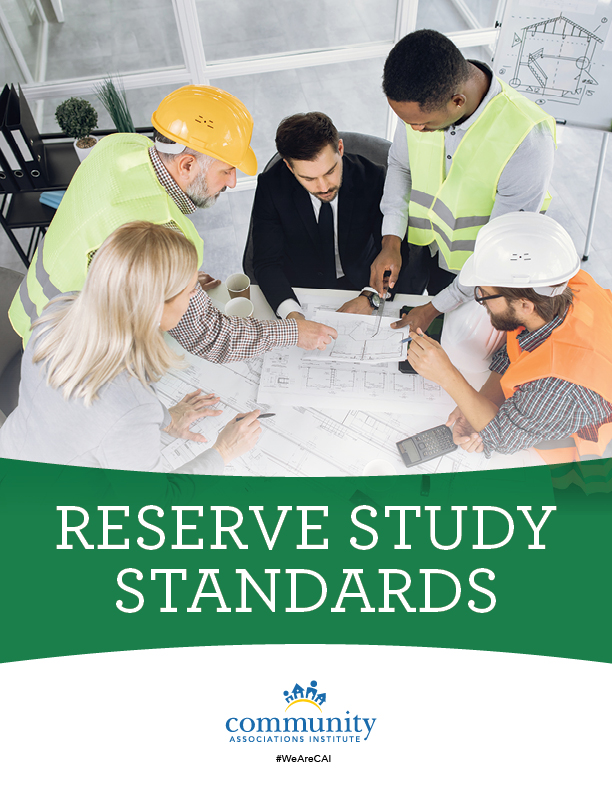Community associations should incorporate preventive maintenance and structural inspections into their reserve studies—the important budget planning tools that identify the components a community association is responsible for maintaining or replacing, indicate the status of the reserve fund, and provide a stable and equitable funding plan to offset anticipated future major common area expenditures. The recommendations are part of new Reserve Study Standards released by CAI.
Following the tragic partial collapse of Champlain Towers South condominium in Surfside, Fla., two years ago, CAI convened working groups to discuss public policy solutions to promote safer and more financially sound buildings. The working groups developed CAI’s Condominium Safety Public Policy Report, recommending reserve studies and reserve funding for all community associations as well as structural inspections and maintenance. CAI subsequently convened a task force to review and update the Reserve Study Standards to incorporate maintenance and structural integrity into the reserve study process.
“One of the primary responsibilities of a community association board is to protect, maintain, and enhance the assets of the association,” says Thomas M. Skiba, CAE, CAI’s chief executive officer. “CAI believes that a proactive preventive maintenance plan and ongoing periodic structural inspections should be incorporated into the community’s long-term planning. This will allow communities to properly evaluate and budget for the ongoing care of the common area components as well as the structural safety of the community.”
CAI urges community associations to regularly update their reserve studies to reflect ongoing changes to components and financial needs. These multiyear plans help communities anticipate and responsibly prepare for ongoing preventive maintenance, periodic structural inspections, as well as for the timely repair and replacement of common area components such as roofs, roads, mechanical equipment, and other portions of the community’s common elements.
Originally published in 1998, CAI’s Reserve Study Standards provide a consistent set of terminology, calculations, and expectations so reserve study providers and those they serve together can build a safe and successful future for millions of community association homeowners.
The Reserve Study Standards provide guidance and methodology in the preparation of reserve studies for all varieties of community association ownership types and physical configurations. These standards establish the procedures from conceptual development through report preparation. Consistent application of these standards will minimize differences in component selection and funding recommendations by different reserve study providers. As a result, association leaders will receive consistent, credible, and defensible reserve studies.
>>Access the new Reserve Study Standards at www.condosafety.com.




Your definitions of fully funded reserves are not wrong but they are less than helpful.
A fully funded reserve is one that is on track, given annual funding, to provide full funding for each component by the end of its estimated useful life.
To calculate that path, for each component, what matters is
Annual funding = (replacement cost – the amount in reserves)/remaining useful life. In your example that would mean $1000 annual funding in each of the next 6 years.
If in your calculation, FFB = Current Cost X Effective Age/Useful Life, FFB = $4000, and an association had $2000, they would be less than fully funded. But they would NOT need to add $2000 right away. Instead, they would need to add $1333 in each of the next six years.
These comments conflate Funding Method with Funding Goal which are both defined in the standards. The given example to contribute $1,333/year for six years describes the “Component Method” which is one way to achieve the Fully Funded goal. Shoving an extra $2,000 into reserves is one possible “Cash Flow Method” to achieve the Fully Funded goal. The comments address the Funding Method and not the Funding Goal which is a common error.
While Reserve Studies continue to alert us Board Members to potential pitfalls of neglected asset management, new technology such as Asphalt roof maintenance has been ignored by all parties even though some Reserve Study companies often include periodic asphalt maintenance for driveways and pavements.This is especially troublesome as our roadways and roofs are in fact, the two largest and most costly assets of condominiums.
I’m still trying to determine what constitutes a “building”.
Are only multi-story condo’s a part of the new inspection rules?
Specifically, would a two story condo with 6 units be considered for needed structural inspections?
Is there an alternative, more precise formula for FFB? Instead of FFB = Current Cost X Effective Age/Useful Life, does the CAI standard allow:
FFB = ((Current Cost X Effective Age) /UL) * (2 – (1/((1+Inflation)^Remaining Life))
This FFB returns a larger value, thus requiring a higher reserve to achieve the same percent funded.